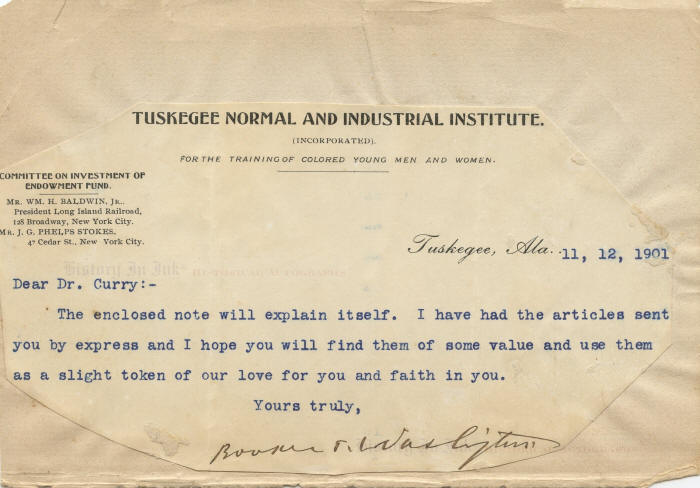1720701
Booker T. Washington
Scroll down to see images of the item below the description
" . . . a slight token of our love for you and faith in you"
Booker Taliaferro Washington, 1856–1915. African-American educator and leader. Partial Typed Letter Signed, Booker T. Washington, one page, 4" x 7½", on stationery of the Tuskegee Normal and Industrial Institute, Tuskegee, Alabama, November 12, 1901.
Washington writes to Dr. J. L. M. Curry, : “The enclosed note will explain itself. I have had the articles sent you by express and I hope you will find them of some value and use them as a slight token of our love for you and faith in you."
Jabez Lamar Monroe Curry (1825–1903), a strong advocate of free universal education, wrote the introduction to Washingtonʼs first autobiography, The Story of My Life and Work (1900). Curry, who was born in Georgia and raised in Alabama, had been a lieutenant colonel in the Confederate Army. He served three terms in the Alabama legislature and two in Congress and also served in the Provisional Congress of the Confederate States. He became a minister after the war, focusing his work on free education in the South. He served as president of Howard College in Alabama and as a professor at Richmond College in Virginia.
Curry became acquainted with Washington through his work with the Peabody Education Fund, a fund devoted to promoting “intellectual, moral, and industrial education in the most destitute portion of the Southern States,” segregated white schools in the Jim Crow South, and the John F. Slater Fund for the Education of Freedmen, the latter of which provided for the education of African-Americans. Curry served as an agent for both funds from 1881 until his death.
In Washingtonʼs second autobiography, Up From Slavery (1901), Washington praised Curry as a “rare" man who was free of racial prejudice and had had “much to do in shaping the policy for the education of the Negro." He wrote:
Dr. Curry is a native of the South, an ex-Confederate soldier, yet I do not believe there is any man in the country who is more deeply interested in the highest welfare of the Negro than Dr. Curry, or one wo is more free from race prejudice. He enjoys the unique distinction of possessing to an equal degree the confidence of the black man and the Southern white man. I shall never forget the first time I met him. It was in Richmond, Va., where he was then living. I had heard much about him. When I first went into his presence, trembling because of my youth and inexperience, he took me by the hand so cordially, and spoke such encouraging words, and gave such helpful advice regarding the proper course to pursue, that I came to know him then, as I have known him ever since, as a high example of one who is constantly and unselfishly at work for the betterment of humanity.
Washington led the Tuskegee Normal and Industrial Institute from 1881, when he was but 25 years old, until his death. He skillfully navigated the political realities of social segregation in the Jim Crow-era South, promoting education for African-Americans while arguing that they could gain social equality by ”industry, thrift, intelligence and property." He assembled a coalition of African-Americans and liberal whites, including ministers, educators, editors, and businessmen. He attracted the attention and respect of political leaders, including Presidents Theodore Roosevelt, who hosted him at the White House, and William Howard Taft. He garnered the moral and financial support of white philanthropists such as Henry H. Rogers of Standard Oil, Julius Rosenwald of Sears, Roebuck & Co., George Eastman of Kodak, and Anna T. Jeanes. As later historians have described him, Washington "advised, networked, cut deals, made threats, pressured, punished enemies, rewarded friends, greased palms, manipulated the media, signed autographs, read minds with the skill of a master psychologist, strategized, raised money, always knew where the camera was pointing, traveled with an entourage, waved the flag with patriotic speeches, and claimed to have no interest in partisan politics. In other words, he was an artful politician." Booker T. Washington Rediscovered 209 (Michael Scott Bieze & Marybeth Gazman, eds., 2012).
This letter has been trimmed from the original stationery and tipped to an album page, as was a common practice among early autograph collectors. It is priced accordingly.
Washington has signed with a strong dark brown fountain pen signature. The letter itself has two horizontal fold lines, one of which faintly affects the “h" in Washingtonʼs signature. Overall the piece is in very good condition.
Unframed.







